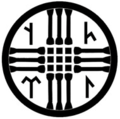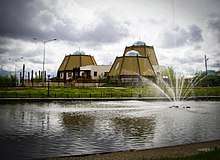Aiyy Faith
The Aiyy Faith (Yakut: Айыы итэҔэлэ, romanized: Aiyy Iteghele) is a neo-Tengrist Yakut religious organization has been registered since 2015 in Yakutsk, Sakha Republic (Yakutia), Russia.[1] It is former organization Kut-Siur (Yakut: Кут-сүр — Heart-Soal-Mind) founded in 1990 and established in 1993 in Yakutsk.[2][3]
 | |
| Formation | 2015 Yakutsk, Sakha Republic (Yakutia), Russia |
|---|---|
| Founder | Lazar Afanasyev (Téris) |
| Type | Religious organisation |
| Purpose | Educational, Philanthropic, Religious studies, Spirituality |
| Headquarters | Yakutsk, Sakha Republic (Yakutia) |
Area served | Sakha Republic (Yakutia) |
Philosopher | Lazar Afanasyev (Téris) |
Main organ | Council Body |
| Affiliations | Tengrism |
| Part of a series on |
| Tengrism |
|---|
 |
| A Central Asian–Eurasian Steppe and partly Siberian–East Asian religion |
| Supreme deity |
| Other deities/spirits |
| Movements |
| Related movements |
| People |
| Priests |
| Scriptures |
| Holy places |
| Toponyms |
| Related conceptions |
|
|
Its founder is philologist Lazar Afanasyev, PhD (Russian: Лазарь Андреевич Афанасьев) alias by ethnic name Téris, who studied shamanism in the Soviet years. His teaching is a monotheistically modernized Yakut version of Tengrism and is set forth in the book "Teachings of Aiyy."[4]
Aiyy (Tangra)—Creator God—in the 9th Heaven. All the other 63 deities of the Yakut pantheon are his manifestations. "White shamans" serve him (while it is forbidden to turn to the "black shamans" of Yakut paganism). Man consists of three souls (Kut): the soul-earth, soul-air, and soul-mother, returning to Aiyy.[5] When some traditionalists ask about the sources of this teaching, he replies that he received from "white old spirit".[6]
Main posts of organization are Philosopher and Toyon (Tribal chief). It has the Aiyy houses and yurts in the villages in which common prayers and bloodless sacrifices with fermented mare's milk are performed. The doctrine influenced the content of teaching national culture in schools and especially on the training of personnel at the local College of Culture.[3][7]
From the very beginning, the organization collaborated closely with the Yakut national movement "The Future of the Yakuts" (Sakha Kaskile) led by Ivan Ukhkhan. Together they requested from the beginning of the 1990s allow the construction of the temple: in 1999, by a decree of the republican authorities, the House of Purification (Archie Diete), the building from a wood, glass and metal wonder composed in the form of three gigantic yurts was laid down and opened in 2002.[8][9] However, back in 2001, the local Orthodox archbishop sharply criticized the construction of the "pagan temple" (kapishche). And after the new President of Yakutia was elected in 2002, the pro-Orthodox course of the authorities began, representatives of ethnic religions ceased to be invited to inter-religious meetings. The House of Purification was taken away and transferred to the city, which turned it into a house of culture. Religious and political activists demand to return it, as well as build the "Three Birch" National Park promised by the authorities and a pagan school in Yakutsk.[10][1] However, the authorities stopped trying to prevent the spread of Aiyy Faith at the grassroots level in the villages.[11]
See also
Footnotes
- Popov 2016.
- Vorontsova & Filatov 2006, pp. 134, 142–44.
- Balzer 2005, p. 62.
- Vorontsova & Filatov 2006, pp. 134, 142.
- Balzer 2005, p. 61; Vorontsova 2006, p. 142; Tomski 2014, pp. 3–109; Popov 2016; Filatov.
- Balzer 2005, pp. 62–63.
- Vorontsova & Filatov 2006, p. 142.
- Balzer 2005, pp. 58–59.
- Vorontsova & Filatov 2006, p. 145.
- Vorontsova & Filatov 2006, p. 149.
- Vorontsova & Filatov 2006, p. 147.
References
- Balzer, Marjorie Mandelstam (2005). "Whose Steeple is Higher? Religious Competition in Siberia" (PDF). Religion, State & Society. 33 (1): 57–69.CS1 maint: ref=harv (link)
- Popov, Igor (2016). "Тюрко-монгольские религии (тенгрианство)" [Turko-Mongolic Religions (Tengrism)]. Справочник всех религиозных течений и объединений в России [The Reference Book on All Religious Branches and Communities in Russia] (in Russian). Retrieved 2019-12-13.CS1 maint: ref=harv (link)
- Tomski, Grigori (2014). "Якутский тангризм: Схема Тэриса = Tangrisme sakha: Schéma de Teris" [Yakut Tangrism: Scheme by Teris]. Concorde (in Russian and French) (3): 3–109.CS1 maint: ref=harv (link)
- Vorontsova, L.; Filatov, S. (2006). "Язычество в Республике Саха (Якутия) (учение Айы, тенгрианство, "Кут-Сюр")" [Paganism in Sakha Republic (Yakutia) (Aiyy Teaching, Tengrism, "Kut-Siur")]. In Bourdeaux, Michael; Filatov, Sergey (eds.). Современная религиозная жизнь России. Опыт систематического описания [Contemporary Religious Life of Russia. Systematic description experience] (in Russian). 4. Москва: Keston Institute; Логос. pp. 134–50. ISBN 5-98704-057-4.CS1 maint: ref=harv (link)
Primary sources
- Afanasyev, L. A. (Teris) (1993). Айыы уорэҔэ [Teachings of Aiyy] (in Sakha). Якутск: Министерство культуры Республики Саха (Якутия).CS1 maint: ref=harv (link)
- Afanasyev, L. A. (Teris) (2002). Айыы суола [The road of Aiyy] (in Sakha). Якутск: Бичик.CS1 maint: ref=harv (link)
